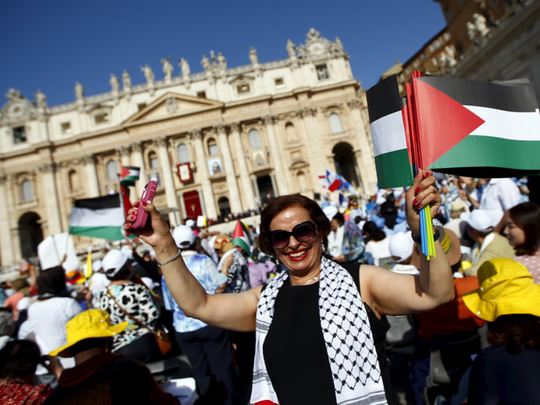
Ramallah: The policies of the Israeli occupation have contributed in no small measure to the the dwindling Christian population of Palestine. Currently, Christians constitute only 0.8 per cent of the Palestinian population in areas that were historically a part of Palestine.
The Israeli occupation stands accused of giving shape to dubious plans to force the Christian population out of Palestine because it wants to present the struggle with the Palestinians as a religious struggle — an objective for which it is served well by the tales of Christians in hardship.
Dr Hanna Eisa, Secretary-General of the Christian-Islamic Commission to Support Jerusalem and the Holy Sites, said: “With the presence of the Christians in Palestine, the entire struggle equation appears differently. It should be clearly and undoubtedly understood that the presence of the Christian population is a vital Palestinian political interest.”
Dr Eisa, who is an expert on issues concerning the Christians in historic Palestinian areas, said that of the total Palestinian population of 12.1 million, there are 40,000 Christians in the West Bank (there were 110,000 Christians in the West Bank in 1948; in 2005, the number was 123,000). He added that in Jerusalem the number of Christians could be put at 4,000 (in 1948, there were 27,000 Christians in the holy city) and only 900 Christians in the Gaza Strip (prior to Israel’s 2014 Gaza war, there were 1,231 Christians in the coastal enclave and, in 1994, there were 7,500 Christians in Gaza).
“There is no doubt that the Christian population in Palestine has been dwindling at a notable and accelerating rate. There is unfortunately no policy or strategy in place to put an end to this disastrous trend,” Dr Eisa told Gulf News.
During the Palestinian Nakba in 1948, a total of 50,000 Christians emigrated from Palestine and were expelled from their hometowns by Israel.
Dr Eisa said the Israeli occupation seized 35 per cent of the land and property of Christians in occupied Jerusalem after the six-day war in 1967.
“The miserable and deteriorating economic conditions in the Palestinian territories have constantly added to Christian emigration from Palestine,” he said, adding that Christians live in urban areas and are always on the lookout for employment. “When they had no choice, they emigrated from Palestine in search of better living conditions,” he said. “There are no real development projects to keep the Christians on their lands and properties. It is always verbal [promises] and nothing really on the ground.”
The feeling runs deep among Christians that their problems will not be addressed, he said. “On the contrary, we see that forces are joined and united to force as many Christians as possible out of the historic Palestine.”
Dr Eisa pointed out that the Christian history in Palestine is not even mentioned in the Palestinian curricula when historically the Christians could be considered the real root of the Palestinian population. At the time the Muslim Caliph Omar Bin Al Khattab took control of Jerusalem, 95 per cent of the Palestinian population was Christian, he said.
A 2012 study found that the role of Christians in the Palestinian economy is significant. Around 45 per cent of the civil institutions and bodies in the Palestinian territories have some fundamental link with Christians and, in the West Bank, Christian churches are one of the largest providers of employment after the Palestinian National Authority.












